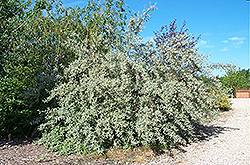>> Home
Height: 6 feet
Spread: 5 feet
Sunlight:
![]()
Hardiness Zone: 2a
Description:
A colorful shrub for tough places, will grow in the driest, poorest conditions; showy silver-green foliage, attractive arching habit and fragrant flowers are primary attributes; suckers less than silverberry, great for embankment erosion control
Ornamental Features
Silverscape Olive is primarily valued in the landscape or garden for its cascading habit of growth. It features subtle fragrant buttery yellow bell-shaped flowers along the branches in late spring. It has attractive silver deciduous foliage. The fuzzy oval leaves are highly ornamental but do not develop any appreciable fall colour.
Landscape Attributes
Silverscape Olive is a multi-stemmed deciduous shrub with a shapely form and gracefully arching branches. Its relatively fine texture sets it apart from other landscape plants with less refined foliage.
This shrub will require occasional maintenance and upkeep, and is best pruned in late winter once the threat of extreme cold has passed. Gardeners should be aware of the following characteristic(s) that may warrant special consideration;
- Spreading
Silverscape Olive is recommended for the following landscape applications;
- Hedges/Screening
- Naturalizing And Woodland Gardens
Planting & Growing
Silverscape Olive will grow to be about 6 feet tall at maturity, with a spread of 5 feet. It tends to be a little leggy, with a typical clearance of 1 foot from the ground, and is suitable for planting under power lines. It grows at a fast rate, and under ideal conditions can be expected to live for approximately 25 years.
This shrub should only be grown in full sunlight. It is very adaptable to both dry and moist locations, and should do just fine under average home landscape conditions. It is considered to be drought-tolerant, and thus makes an ideal choice for xeriscaping or the moisture-conserving landscape. It is particular about its soil conditions, with a strong preference for clay, alkaline soils, and is able to handle environmental salt. It is highly tolerant of urban pollution and will even thrive in inner city environments. This particular variety is an interspecific hybrid.
